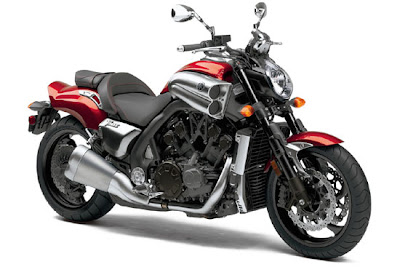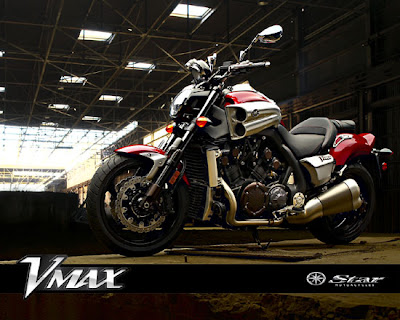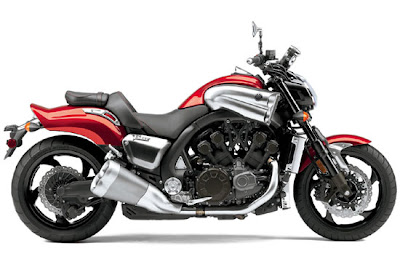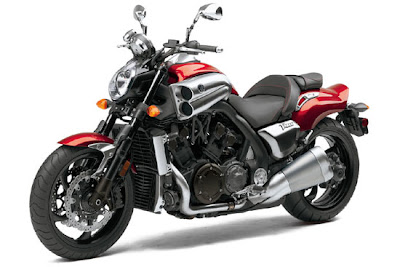
2010 Yamaha V-Max motor VMX17 - Specifications and Features
2010 Yamaha V-Max motor VMX17 is a legend. With a capacity of 1679cc engine with 4 cylinders. Vehicles that were created to be the king on the track with technology so advanced and sophisticated electronic systems. That makes Yamaha V-Max VMX17 a special class. Also chassis is made as light as possible but still to create a balance in the Yamaha V-Max VMX17. And for combustion systems use a method that uses sophisticated immobilizer chip embedded on the 2010 Yamaha V-Max VMX17. For more information about specifications, features existing on the 2010 Yamaha V-Max VMX17, you can see below.
2010 Yamaha V-Max VMX17 - USA Specifications
MSRP: $19,500 USD (Candy Red) Available from November 2009
Engine
Type 1679cc liquid-cooled 65° V-4, DOHC, 4 valves/cylinder
Bore x Stroke 90.0mm x 66.0mm
Compression Ratio 11.3:1
Fuel Delivery Fuel Injection with YCC-T and YCC-I
Ignition TCI: Transistor Controlled Ignition
Transmission 5-speed, multiplate slipper clutch
Final Drive Shaft
Chassis
Suspension/Front 52mm telescopic cartridge fork w/oxidized titanium coating. Fully adjustable preload, compression and rebound; 4.7 in travel
Suspension/Rear Single shock w/remote reservoir and remote adjustable for preload, compression and rebound
Brakes/Front Dual 320mm wave-type discs; radial mount 6-piston calipers, Brembo® radial pump master cylinder
Brakes/Rear 298mm wave-type disc, single-piston caliper and Brembo® master cylinder
Tires/Front Bridgestone® Radial 120/70-R18 59V
Tires/Rear Bridgestone® Radial 200/50-R18 76V
Dimensions
Length 94.3 in
Width 32.3 in
Height 46.8 in
Seat Height 30.5 in
Wheelbase 66.9 in
Rake (Caster Angle) 31.0 in
Trail 5.8 in
Fuel Capacity 4.0 gal
Fuel Economy** 27 mpg
Wet Weight*** 683 lb / 685 lb (CA model)
Features and Benefits:
Engine:
-DOHC 4-valve "pent roof" cylinder head design provides optimum breathing efficiency for incredible engine performance. Valve actuation is via under bucket shims. Compression ratio is 11.3:1.
-Liquid-cooled, 1,679cc, DOHC, 16-valve, 65°, V-4 engine has no equal in its class. The compact engine design has allowed the engineers to place the engine in the "sweet spot" of the frame to optimize handling.
-High-performance camshafts provide incredible engine performance. Centrifugal decompression device on the exhaust cam means fast, easy starting.
-Steel valves are used for excellent durability. Intake valves are 34mm in diameter with a 14-degree valve angle while exhaust valves are 30mm with a 15 degree valve angle.
-Automatic hydraulic cam chain tensioners reduce engine mechanical noise.
-"Combination" chain and gear camshaft drive system is utilized. With this system, only the intake cams are driven by a chain (attached to the crank), the exhaust cams are driven by a gear drive off the intake cams. This design allows for more compact cylinder heads since the distance or "pitch" between the camshafts is reduced.
-Lightweight, forged, aluminium short skirt pistons help provide fast throttle response, reduced vibration and provide excellent durability.
-Connecting rods are carburized and use a nut less design. The lower end "cap" of the rod is made from the same piece of material as the upper portion; this design is known as "fracture splitting". This design aids in establishing true big end roundness, greater precision in con rod dimensions and are extremely durable.
-High-performance direct ignition coils (ignition coil is built into the spark plug cap) reduce weight while iridium spark plugs and high-output magneto deliver increased spark energy.
-ACM magneto produces 420 watts of power at 5,000 rpms.
-Functional hand finished aluminium intake covers highlight Yamaha's quality and attention to detail.
-Compact rear shaft drive gear case assembly reduces weight and improves styling.
-4-into-1-into-2 into-4 exhaust system is used. Not only does it make a serious styling statement but also provides excellent performance and reduced emissions thanks to a 3-way honeycomb catalytic converter in the under engine "muffler box". It also features Yamaha's patented Exhaust Ultimate Power Valve (EXUP). This system monitors engine rpm and adjusts exhaust flow (via the EXUP valve) for maximum performance at all rpms with no "flat spots". This system helps to improve torque, optimize fuel economy and reduce emissions too.
-5-speed transmission features optimized gear ratios for maximum acceleration and performance. 5th gear is an overdrive gear to reduce engine rpm at highway speeds for a comfortable ride.
-Hydraulically activated, ramp-type slipper clutch featuring 10 friction plates is used to deliver consistent clutch performance with a light lever pull and minimal maintenance. A slipper or back limiter clutch assembly reduces rear wheel hop when making hard downshifts or under hard braking. The clutch master cylinder is a Nissin design using a 14mm piston. The clutch lever offers 4 positions of adjustability.-
-Clean, quiet, smooth low-maintenance shaft drive is used. This system features dual "U" joints to accommodate the extra wide rear tire.
-Open deck type cylinder sleeves are used for maximum cooling efficiency.
-Lightweight magnesium alloy crankcase covers are used.
-Crankcase design incorporates the cylinders into the upper half of the cases for reduced weight. Ceramic composite cylinder "bores" are a "liner-less" design with the ceramic coating sprayed directly on the aluminium block to ensure great heat dissipation for consistent power delivery, reduced friction and reduced weight.
-Mikuni fuel injection system uses four 48mm throttle bodies fitted with T.P.S. (Throttle Position Sensor) and numerous other sensors. An oxygen sensor has been fitted into the exhaust making this a "closed loop" type FI system. The benefits include excellent throttle response, great fuel economy, reduced emissions, stable idling and no choke to fuss with during start up. The closed loop design means the system is constantly monitoring the fuel / air mixture and adjusting it as required for maximum performance plus reduced emissions.
-The VMAX utilizes a lightweight main Electronic Control Unit (ECU) that in fact consists of 3 - ECUs in total. The main 32-bit ECU controls the ignition and fuel injection process, while a 2nd and 3rd integral ECU controls the YCC-T & YCC-I. This "combined" ECU design reduces weight.
-Yamaha Chip Controlled Throttle (YCC-T) electronically controls the throttle valves for outstanding response and improved controllability at all rpms. This system features twin Throttle Position Sensors (TPS) and a D.C. motor driving the throttle valves. The YCC-T is used to provide even more control of the intake air volume for smoother torque character. The rider can "mechanically close" the throttles by simply closing the throttle twist grip.-
-Air Induction System (AIS) injects fresh air into the exhaust port area to fully combust any un-burnt fuel, reducing harmful HC and CO emissions for a cleaner environment.
-Large capacity air box uses a viscous-type paper air filter.
-YCC-I or Yamaha's Chip Controlled Intake means the intake funnels / stacks vary in length (between 2 positions) depending on engine rpm. An electronic servo motor varies the funnel length from 150mm (for low to mid rpms) to the short setting of 54mm for high rpm. The transition or switching rpm between the 2 lengths is 6,650 rpms. The revolutionary YCC-I provides the best of both worlds, solid low rpm torque and power combined with an amazing high rpm rush. It takes only 0.3 of a second for the funnels to move from the tall to the short position.
-Gear-driven engine counter balancer shaft is used to reduce vibration and maximize rider comfort. The balance ratio is 50% to allow some pulse feel. Since the crank design is 180 degrees, there is also some inherent natural balancing effect as well.
-Twin radiator design features a curved upper rad and lower flat rad for maximum cooling efficiency. Each rad has its own cooling fan.
-An oil-to-coolant heat exchanger type oil cooler maintains stable lubricant temperatures for increased performance and extended engine life.






